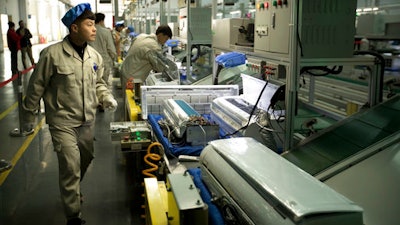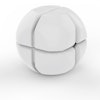
QINGDAO, China (AP) — After Haier Group bought the General Electric Co. appliance unit last year, the Chinese company's chairman says he gave its American managers unusual orders: Ignore me.
Zhang Ruimin built Haier from a failing refrigerator factory in the 1980s into the biggest maker of major appliances (view photos in gallery).
Now, he is trying to transform a traditional manufacturer with 60,000 employees in 25 countries into a nimble, Internet Age seller of consumer goods and services from web-linked washing machines to food delivery.
To do that, Zhang has broken up Haier into a "networked company" of hundreds of independent business units with orders to act like customer-focused startups. He says GE Appliances will be given almost total autonomy.
"One of their senior managers asked, how are you going to control us?" said Zhang in an interview at Haier headquarters in this eastern Chinese city. "I said, I'm not your boss. I'm not your leader. The leader is one person: The user."
Zhang, who at 68 is still on the job a decade after many Chinese CEOs have retired, is leading Haier through radical changes to compete in a fast-evolving global market — changes that now include GE Appliances and its 12,000 employees, most of them in the United States.
Haier's approach is a high-profile example of a wave of management experiments by Chinese companies as they expand into global markets.
The founder of e-commerce giant Alibaba Group, Jack Ma, announced plans in 2013 to split it into 25 divisions to revive the innovative spirit of its startup days. After buying Volvo Cars in 2012, automaker Geely Holdings left Swedish managers to run the company while they also cooperate on developing cars its Chinese brands might export.
Companies that grew rapidly during China's boom of the past decade also are spending heavily to invent or buy technology to improve their competitive edge as the economy cools.
Midea Group, another Chinese appliance maker, bought one of the leading makers of industrial robots, Germany's Kuka, last year.
Haier's tie-up with GE Appliances should help both companies, said Dinesh Kithany, the chief appliance industry analyst for IHS Markit. Haier gets GE technology while the American brand gets access to Haier's distribution network to expand its global presence and can learn from faster-paced Chinese product development.
"GE Appliances is a perfect decision for them," said Kithany.
Zhang launched his overhaul of Haier in 2005, splitting structures with thousands of employees into units sometimes as small as a few dozen people to focus on a single appliance or service.
Headquarters acts like a venture capital investor: Employees propose new businesses and, if Zhang and other executives like them, receive financial backing. They have to hit financial targets but are left to manage the venture.
That network has expanded to include ventures launched with outside entrepreneurs who get money and other support from Haier.
"We don't want just to produce products," said Zhang. "We want to produce creators."
In person, Zhang is amiable and quiet. With bushy, salt-and-pepper hair, he seems more like a popular high school teacher than one of Asia's most acclaimed executives — a striking contrast to some of the forceful egos of the Chinese business world. He chuckles and shrugs as he talks about challenges Haier faces.
At GE Appliances, no managers from China moved in after the $5.4 billion acquisition closed in June. The only public change was three words added to the bottom of the U.S. brand's website: "A Haier Company."
Haier took a similar approach at Fisher & Paykel, a New Zealand appliance brand acquired in 2012.
Haier has tried to speed up product development by using the internet to ask potential customers for suggestions and feedback, an approach taken by Chinese smartphone brands. The company says a new appliance can go from drawing board to market in as little as one year, down from more than three.
Zhang's management changes "are more impressive than we see anywhere," said William A. Fischer, a professor at the IMD business school in Switzerland who has followed the company for a decade. He co-wrote the 2013 book, "Reinventing Giants: How Chinese Global Competitor Haier Has Changed the Way Big Companies Transform."
"He trusts his employees to play more of a leadership role," said Fischer.
Fischer said a group of European executives he took to Haier headquarters two years ago refused to believe its decentralized style could work.
"I was struck by how daring Haier was in their thinking. And the people I was working with were hostages to very traditional ways of working," said Fischer.
The strategy appears to be paying off. Last year's profit rose 12.8 percent from 2015 to 20.3 billion yuan ($2.9 billion) on revenue that increased 6. 8 percent to 201.6 billion yuan ($29.3 billion). Transaction volume on its business-to-business and consumer-oriented internet platforms rose 73 percent to 272.7 billion yuan ($39.6 billion).
"Some of my contacts at Fisher & Paykel say they are better off now under Haier than they were on their own," said Kithany.
Haier's decentralization could help at a time when President Donald Trump is promising to raise U.S. duties on Chinese goods and pressure for trade restrictions is growing in Europe.
Years ago, Haier identified seven "economic protection zones" including North America and the European Union that might limit trade, Zhang said. It set up factories in each one.
Haier gained a U.S. foothold in the 1990s when its mini-refrigerators became a hit with college students. In 2000, it became one of the earliest Chinese manufacturers with U.S. operations when it opened a factory in Camden, South Carolina.
"I noticed talk about such things as Trump's desire for a border tax. But for Haier, there is little impact," said Zhang. "We have factories in more than 20 countries, so we have become a localized brand."
Haier was an early promoter of the "Internet of Things," a strategy of linking appliances and other consumer electronics that GE Appliances says it wants to pursue.
During the 2008 Summer Olympics, Haier displayed a model house in a Beijing park with lighting, appliances, entertainment and other features linked by internet.
Haier is using such networked appliances as springboards into faster-growing e-commerce and other services.
Zhang emphasizes that by distinguishing between customers, who make a one-time purchase of an appliance, and users, with whom Haier will form long-term relationships. He points to the example of a refrigerator sold in China with a touchscreen on the door that has links to 400 suppliers of organic food.
Haier is starting to act like a smartphone manufacturer, treating its appliances as a channel for selling a steady stream of revenue-generating services, said Kithany.
A $500 refrigerator could make far more money for its seller if it includes an e-commerce connection that can reap a share of the $20,000 a family might spend on groceries during its 15-year life span, said Kithany.
Zhang said he launched Haier's overhaul after concluding it was handicapped by the "thick chunk" of middle management focused on planning, finance and other functions.
The change was painful, wiping out 10,000 jobs.
"We gave them two options: they can be like anyone else and look for someone in Haier to form a team to create a product," he said. "If they cannot become an entrepreneur, they have to leave. A lot of people left."
The more than 1,000 "micro-enterprises" launched by Haier include 47 that have raised money from outside investors, Zhang said.
Employees of those units were required to put in their own money "to make sure everyone shares in the success," he said. One team raised 11 million yuan ($1.6 million) and some employees sold their homes to make their contribution.
"Once I am sure this process is a success, then I can retire," he said.






















